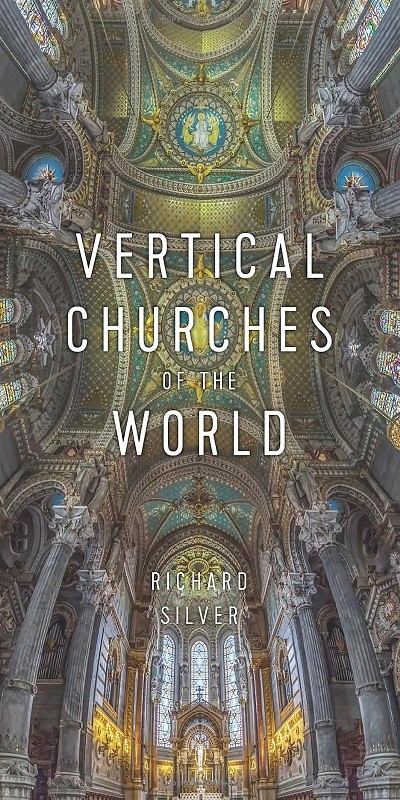Review: Vertical Churches of the World by Richard Silver
Panoramas have been around for almost as long as photography, going all the way back to the moving slit cameras used to take the apocryphal school complement shot with the same pupil at each end! Digital photography has brought panoramas to the masses as the facility is now available on almost all mobile camera phones. Commercially they make very saleable wall pictures.
The most frequent orientation for a panorama is the horizontal rendering along a flat plane in a cylindrical projection – equivalent to the viewer gazing straight ahead at the horizon while standing on a rotating table (think if a very small elf on a record player!). It was always possible to turn the camera to rotate and sweep vertically but this was something of a rarity. The first time I saw it was while assisting Imagemaker contributor, Paul McMullin, for a book project about Liverpool. Paul used his specialist Fiji 6×17 format 120-film camera vertically to capture Liverpool Anglican Cathedral from the horizontal through to the bell tower aperture in the tower roof. This was 2004 and by that time specialist panorama software and tripod pan heads were available (which we used at the time for the Cathedral’s Centenary celebrations) although it was a computer-intensive process to complete the virtual reality rendering (often overnight). PT GUI software had been around for three years by this time and remains one of the leading panorama software programs even today. It brought with it the ability to change the field of view of the panorama (ie where the gaze of the eye was aligned within a virtual sphere) and from this both vertical and horizontal panoramas could be output for printing.
Vertical Churches of the World by Richard Silver on Amazon UK.
The ability to merge panoramas was introduced into Photoshop in version CS3 in 2007 when Auto Align Layers, Auto Blend Layers and Photomerge were incorporated.
And so we arrive at Richard Silver’s efforts, starting in 2012 and brought together as a body of work in this book Vertical Churches of the World. By any reckoning it is a huge effort, Richard Silver has visited 94 countries and 350 cities and we are are shown 154 of the vertical panoramas from his travels. They have been widely acclaimed and if you search for his name you will find images of him standing before magnificent exhibition pictures of his work. One of the inherent advantages of stitched panoramas is that you can make huge prints (the reviewer’s largest to date is 52 feet wide and 27GB but this is quite small compared with others!).
Vertical panoramas are a wonderful way of showing off almost all of the significant interior detail of a church, although some find the format unsettling. One of the things you find when reading the book is that you turn it though 180 degrees to view the ‘top end’ of the pictures! Other viewers find it more relaxing to view the images in the horizontal. Even so the breath of architecture on view is astounding.
The book contains little information on photographic technique other than to report that the author often handholds using quite high ISO settings, a 24mm lens and between five and eight images. These are stitched together in Photoshop using Photomerge and it is a testament to just how clever the algorithms are today that generally the slight mismatches in alignment will be taken care of. For readers who are curious abut the technicalities it was written up in some detail by Cristina Pascu-Tulbure and the reviewer in the May 2022 issue of Imagemaker. Between us we managed to create some bizarre stitches and the takeaway lesson was to persevere, watch out for camera auto-rotations and try stitching as a horizontal, landscape format as this sometimes solves issues. With a seven-image stitch (of a 24mm lens) the resulting file could be printed at 10 feet high with little degradation of quality (it was eventually used at eight-feet high in a display stand printed to vinyl).
Overall there is little to say about the book other than that it a feast of church architecture presented in an unusual and engaging format which will provide hours of viewing. It will certainly cause the reader to take a closer look at the church ceilings they walk under while on holiday! It is unreservedly recommended.
Vertical Churches of the World by Richard Silver. Hardback 200 pages, 13-inch
by 7-inch format. ISBN 978-0-578-94118-9.
Published by Richard Silver Photo LLC.
Available on Amazon at £24.03 ($29.95)
Vertical Churches of the World by Richard Silver on Amazon UK.










